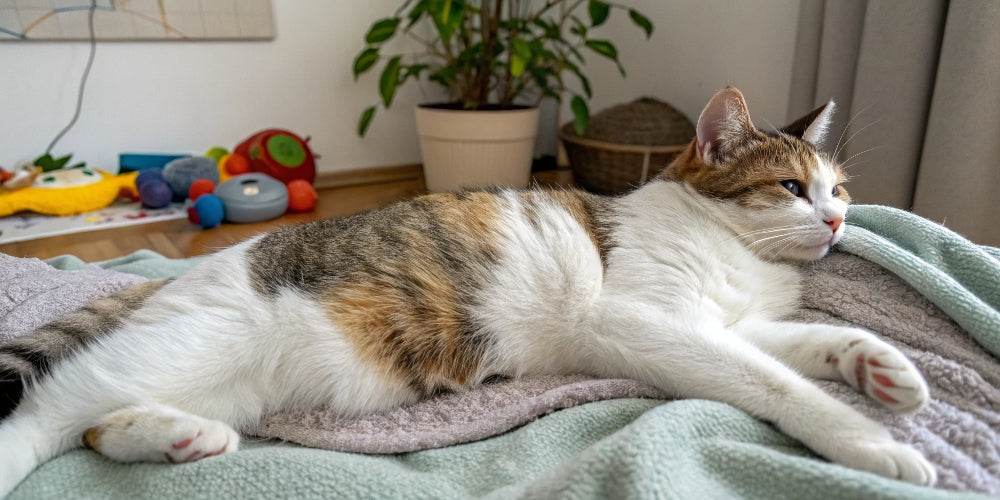
Tips and advice for caring for a pregnant cat
Caring for a pregnant cat isn't a very complex task. Nature is wise, and felines are perfectly prepared physically and mentally for this. However, there are some things to keep in mind that can be very helpful in helping the mother have a smoother pregnancy and feel better during this time. It's also important to pay attention to a pregnant cat's diet. In this article, we explain everything you need to know about this process, as well as how you should treat a cat after giving birth. Read on for more information!
How long does a cat's pregnancy last?
The gestation period for a pregnant cat typically lasts approximately 58 to 67 days. This is a time when the cat will require special care and extra attention from us, especially in the final days. You should keep in mind that the first sign of labor in a pregnant cat usually manifests with a drop in temperature to approximately 37.8°C, accompanied by abdominal contraction and vaginal discharge.
Caring for a pregnant cat
A pregnant cat often changes her behavior once her belly begins to swell. You'll usually notice that the animal avoids touching it for fear of harming the kittens, although you may also observe other very pronounced maternal behaviors, such as excessive purring. Don't worry! It's completely natural. Also, keep in mind that the animal's behavior will change due to its restlessness, and it's quite possible that she may avoid eating. For this reason, our work when answering how to care for a pregnant cat should focus on these last two points.
Caring for a pregnant cat: provide her with a quiet place
You must ensure you provide a quiet place where the animal can feel calm and relaxed. We recommend choosing a cat bed that is comfortable and where it can also feel protected from any worries it may have. The location of the bed is also very important. Make sure to place it in a secluded, quiet place where the cat will feel completely at ease while giving birth and bringing the kittens into the world. Also, avoid placing the new bed in a place exposed to drafts.
Feeding a pregnant cat
As we mentioned when discussing care for pregnant cats, it's quite possible that the cat may have difficulty eating and may not be very hungry—especially if the cat is overweight, as they tend to regulate their weight. It's important that the cat receives a good diet so she can provide all the nutrients to the babies still in her womb. In that case, we recommend opting for puppy food. As for the quantity, you shouldn't worry; cats are generally very good at regulating their food, so let her eat as much as she wants. Keep in mind that the animal's appetite may vary as the pregnancy progresses. It's most common for it to increase while the puppies are developing in the uterus; however, at the end of pregnancy, it will decrease as the space in her stomach cavity is pressed and limited by the space occupied by her offspring.
Although vitamins and supplements aren't usually necessary during pregnancy, they may be needed if your cat is very underweight. In these cases, increased care for pregnant cats is essential to prevent miscarriage. We recommend visiting a veterinarian so they can provide an appropriate diet.
Care for pregnant cats: extra attention and affection
Also very important when it comes to caring for a pregnant cat is the attention and affection we give her during this time. Keep in mind that the animal is at a very sensitive time and will greatly appreciate our caresses and cuddles. You can also choose to play with her, but avoid rough play to ensure the health of the kittens and prevent any abdominal discomfort.
Cat after giving birth: What to do?
As important as caring for pregnant cats is, so is caring for the cat after giving birth. Therefore, it's important to keep in mind some tips that will be very useful. On our blog, you can also find out how to feed kittens during the first few weeks until they reach their first year—paying special attention to weaning:
- Veterinary check-upThe cat should be examined by a veterinarian approximately 12 hours after giving birth with a general physical examination of the uterus.
- Temperature takingAt least once a day for the entire first week, you should take your cat's temperature to ensure there isn't a sudden increase that could indicate infection. It's important that the temperature doesn't go above 40 degrees.
- Increase calorie intakeVeterinarians recommend that calorie intake should be higher while nursing kittens, typically 300% more than normal. After the second week of pregnancy, the cat should eat about three times a day.
- Check vaginal dischargeIt's normal for your cat to expel a large amount of discharge during the first 10 days, and for it to appear bloody. However, if it lasts more than 10 days or smells bad, it's a good idea to take your cat to the vet for a checkup.
- Check the nipples during breastfeedingMake sure they're a normal color and not red or swollen. At this stage, you may have mastitis.
- Don't grab the babiesDuring the first few weeks, the cat may be easily irritable due to her protective instinct. Also, picking up the kittens can infect them with germs, so we should wash our hands thoroughly before doing so—and avoid handling them as much as possible.


